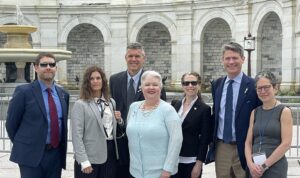Health policy statements
ACR health policy statements are developed by the GAC and approved by the ACR Board of Directors. These statements inform members of Congress, regulatory entities and partner organizations of ACR policy recommendations. These health policy statements are reviewed, updated and approved annually, with provisions offering the ability for revisions and additions to be made as needed to reflect emerging issues.
RheumPAC
RheumPAC is the ACR’s nonpartisan political action committee (PAC) and is the only PAC dedicated to the interests of the rheumatology profession. It was created in 2007 with the goal of educating, electing and supporting federal lawmakers who can positively address the issues that impact rheumatology care providers and people with rheumatic disease. RheumPAC has supported the campaigns of both Republicans and Democrats whose voting records reflect the interests of rheumatology.

The ACR Executive Committee on its way to meet with FDA Commissioner Marty Makary, MD, MPH. (Click to enlarge.)
State & Local Rheumatology Advocacy
The Affiliate Society Council (ASC), a subcommittee of the Committee on Rheumatologic Care, provides a mechanism for the ACR to advocate for rheumatology at the state and local levels. The ASC is one of the most important ways the ACR collaborates with state societies to work on legislative and policy issues confronting our members where they live and work. The Council comprises designees from each state or local society affiliated with the ACR.
Advocates for Arthritis
Once a year, the ACR/ARP brings together rheumatology professionals and patients to advocate on behalf of the rheumatology community. During this event, participants meet with congressional leaders to discuss issues affecting rheumatology. Being involved in Advocates for Arthritis is a great way for members to engage in the legislative process and increase awareness of rheumatology on Capitol Hill.
The ACR/ARP recently completed its 2025 Advocates for Arthritis event, which was attended by more than 100 members of the rheumatology community who participated in 123 meetings with lawmakers from 27 states. Key issues discussed with lawmakers included:
- Preserving access to care for Medicare patients;
- Opposing cuts to Medicaid;
- How PBMs drive up prescription drug costs; and
- Investing in the National Institutes of Health.
The ACR also co-hosted a congressional briefing with the Arthritis Foundation to raise awareness on Capitol Hill about the realities of arthritis and to advocate for sustained investment in rheumatology research.
Other Efforts
In addition, the ACR holds meetings with executive agencies, such as the Food & Drug Administration (FDA) and the Centers for Medicare & Medicaid Services (CMS), to give rheumatology a strong voice in regulatory policymaking that affects rheumatologists and their patients.

